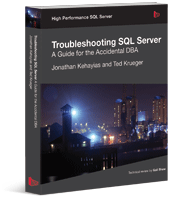I'm very excited to announce that the book, "Troubleshooting SQL Server: A guide for the Accidental DBA" will be at the PASS Summit this year. Jonathan Kehayias is well known as one of the best all-around SQL Server Professionals out there and any publication is always valued. This book is composed of some of the most common problems and real-life experiences that go into resolving them. Even the thought of the caliber of the names on this book putting on paper all they have in steps to resolving some of the worst problems out there, holds a lot of value that can prove, priceless. It gets better. Gail Shaw has also contributed as the editor and contributor on this book. The addition of Gail in this book rounds it out as, in my opinion, one of the best DBA books that you can have on your shelf. One that you can turn to in any event you are in need of determining resolutions to many problems that may happen with SQL Server.
As most of you know, Simple-Talk books are available in eBook. This eBook version is free! So everyone will have access to the content from the book. Of course the printed version will also be available. If you are like me, you like to have a book sitting in your hands when you are reading it.
Although the title of this book references Accidental DBAs, the books in-depth details of SQL Server troubleshooting will far exceed even the most seasoned DBAs expectations. By no means is this book limited to only one audience and it meant to be extremely helpful and educational for anyone in SQL Server.
I hope to see everyone pick this book up. You will not be disappointed in the value it will bring to you daily in your life with SQL Server.
Read Chapter 1 "A Performance Troubleshooting Methodology for SQL Server". This first chapter sets you up for the remaining chapters that cover all of the most common problems that you may run into.
- High Disk I/O –RAID misconfiguration, inadequate I/O throughput, poor workload distribution, SAN issues, disk partition misalignment and more
- High CPU usage –insufficient memory, poorly written queries, inadequate indexing, inappropriate configuration option settings, and so on
- Memory mismanagement – the advent of 64-bit SQL Server removes the memory allocation "shackles" placed on its 32-bit predecessors, but issues arising from incorrect memory configuration are still common
- Missing indexes – arguably the number one cause of wasteful resource usage in SQL Server
- Blocking – caused mainly by poorly designed databases that lack proper keys and indexing, and applications that apply needlessly restrictive transaction isolation levels
- Deadlocking – covering the Bookmark Lookup deadlock, the Serializable Range Scan deadlock, the Cascading Constraint deadlock and more
- Full transaction logs – lack of log backups, hefty index maintenance operations, long running transaction, problems with replication and mirroring environments, and more.
- Accidentally-lost data – "oops, wrong database!" Let's hope you've got backups!
If you are at the PASS Summit this year, look for this at the Red Gate booth as well as Jonathan, Gail and myself.







